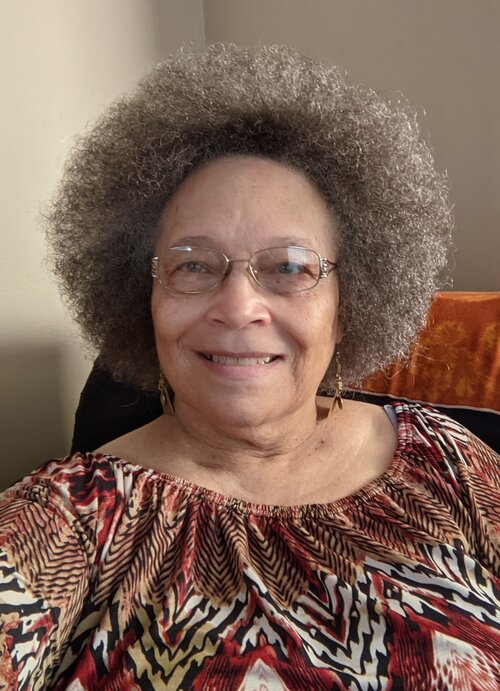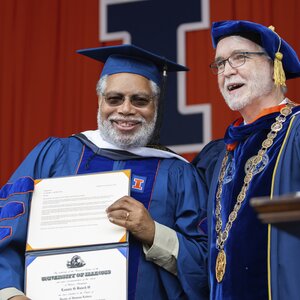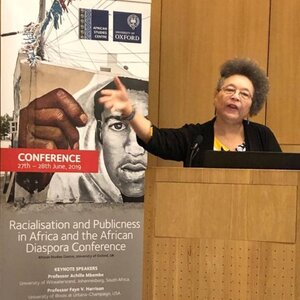
Contact Information
1201 W. Nevada St.
Research Areas
Biography
Faye V. Harrison is a Professor of African American Studies and Anthropology as well as a Faculty Affiliate with the Program on Women & Gender in Global Perspectives, the Center for African Studies, and the Center for Latin American & Caribbean Studies. She is a sociocultural anthropologist specializing in the study of social inequalities, the paradoxes of human rights, and intersections of race, gender, class, & (trans)national belonging (or not belonging). She has also contributed to the history and politics of anthropology and of African American & African Diaspora studies. Some of her recent writings address domestic and global divisions of intellectual labor and performing diverse acts of theory-work on “ex-centric” stages.
She earned her BA at Brown University and her MA and PhD in Anthropology at Stanford University. She has done her most intensive research in the Caribbean, the United Kingdom, and the United States, but her scholarly pursuits and professional activities have also taken her to many other places in the world, including Nigeria, South Africa, India, Denmark, the Netherlands, Japan, and China. She has published extensively on the gendered division of labor within Jamaica’s urban informal economy; the interplay of gangs, crime, and politics in Jamaica; the impact of neoliberal globalization on everyday life in Jamaica, Cuba, and the United States; racism, antiracism, and the paradoxes of human rights in the global context; and critical race feminist methodology as a tool for global research.
Dr. Harrison is the author of Outsider Within: Reworking Anthropology in the Global Age and editor of and contributor to Resisting Racism & Xenophobia: Global Perspectives on Race, Gender, & Human Rights; African-American Pioneers in Anthropology (co-ed.); and three editions of Decolonizing Anthropology: Moving Further toward an Anthropology for Liberation. She has contributed to several important anthologies on the African Diaspora, among them: Afro-Descendants, Identity, and the Struggle for Development in the Americas; Transnational Blackness: Navigating the Global Color Line; Afro-Atlantic Dialogues: Anthropology in the Diaspora; and Blackness in Latin America & the Caribbean. Her writings also appear in significant feminist collections, among them: Third World Women & the Politics of Feminism; Women Writing Culture; Situated Lives: Gender & Culture in Everyday Life; Gender & Globalization: Women Navigating Cultural & Economic Marginalities; and most recently Feminist Activist Ethnography (for which she wrote the foreword).
Among the awards she has received are: the Presidential Award from the American Anthropological Association (2007 and 2018), the Distinguished Service Award from the International Union of Anthropological and Ethnological Sciences (2018), the William R. Jones Most Valuable Mentor Award from the Florida Education Fund (2013), the Legacy Scholar Award from the Association of Black Anthropologists (2010), the Zora Neale Hurston Award for Mentoring, Service & Scholarship (2007) from the Southern Anthropological Society, and the Society for the Anthropology of North America Prize for Distinguished Achievement in the Critical Study of North America (2004). Most recently, the Society for Applied Anthropology selected her to receive the Bronislaw Malinowski Award at the 2022 annual meeting.
She is a past President of the Association of Black Anthropologists (1989-91) and also served twice on the Executive Board of the American Anthropological Association (1990-91, 1999-01). From 1993-2009, she chaired the Commission on the Anthropology of Women, a unit of the International Union of Anthropological & Ethnological Sciences (IUAES). In 2013 she was elected to a five-year term as President of that world organization. During her term of office, the executives of both the IUAES and the World Council of Anthropological Associations (WCAA) collaborated in establishing the bicameral World Anthropological Union (WAU). She co-chaired WAU's inaugural steering committee.
Research Interests
Harrison has published extensively on the gendered division of labor within Jamaica’s urban informal economy; the interplay of gangs, crime, and politics in Jamaica; the impact of neoliberal globalization on everyday life in Jamaica, Cuba, and the United States; racism, antiracism, and human rights in the global context; and critical race feminist methodology as a tool for global research.
Education
Anthropology, Ph.D., Stanford University
Anthropology, M.A., Stanford University
Anthropology, B.A., Brown University
Courses Taught
AFRO 500 Core Problems in African American Studies
AFRO 560 African Diaspora Seminar
AFRO 597 Problems in African American Studies: Race and Racism
AFRO 598 Research Seminar in African American Studies
AFRO 481 Urban Communities and Public Policy
AFRO 415 Africana Feminisms
AFRO 400 African Diiaspora Studies: The Caribbean
AFRO 298 Black Lives Matter
ANTH 466 Class, Culture and Society
ANTH 499 Race, Racism, Antiracism
ANTH 515 Race, Rights, and Power
ANTH 515 Decolonizing Knowledge
Additional Campus Affiliations
Professor, Anthropology
Professor, Women & Gender in Global Perspectives
Professor, Center for African Studies
Professor, Lemann Center for Brazilian Studies
External Links
Recent Publications
(2022) Refusing the God Trick: Engaging Black Women’s Knowledge. In “Colloquy on #CiteBlackWomen,” co-edited by Anne-Maria Makhulu and Christen A. Smith. Cultural Anthropology 37(2):182-190 (May). https://doi.org/10.14506/ca37.2.02
(2021) Foreword. In Dalit writer Anna Bhau Sathe’s 1959 novel, Fakira. Translated from Marathi by Baliram Gaikwad. Pages vii-xxv. Haryana, India: Penguin Random House India.
(2021) Audrey Smedley (1930-2020). Obituary. American Anthropologist 123(3): 728-731. Co-authored with Janis Faye Hutchinson. DOI: 10.1111/aman.13632.
(2021) In Memoriam: Audrey Smedley (1930-2020): A Leading Scholar in the Anthropology and History of Race. Co-authored with A. Lynn Bolles. Transforming Anthropology 29(1):6-8. DOI: 10.1111/traa.12200.
(2020) Valorizing Ancestors and Elders: Remembering Ira E. Harrison. Transforming Anthropology 28(2):144-115, October. https://doi.org/10.1111/traa.12193
(2020) Systemic Racism in the U.S. Assumes a Variety of Covert and Overt Forms. Kourosh Ziabari's interview with Faye Harrison, on behalf of the Organization for Defending Victims of Violence, posted on June 25 at: http://www.odvv.org/blog-3049-ODVV-interview-Systemic-racism-in-the-US-assumes-a-variety-of-covert-and-overt-forms.
(2019) Making the Ambiguities, Absent Presences, and Contradictions of Racialisation Analytically Legible: Reflections on a Critical Intellectual Imperative. Social Anthropology/Anthropologie Sociale 27(4): 641-654 (afterword in special section, "Doing Race in Europe: Contested Pasts and Contemporary Practices"). DOI: 10.1111/1469-8676.12720.
(2019) Unraveling Race for the Twenty-First Century. In Exotic No More: Anthropology for the Contemporary World. Second edition. Jeremy MacClancy, ed. pp. 77-103. Chicago: University of Chicago Press.
(2018) Finding a Path toward a Positive Turn: Facing Trump, the Alt-Right, & the Corporate Oligarchy in Theory & Practice. In Innovación para el desarrollo sostenible (Innovation for Sustainable Development). Nuria Sanz and Carlos Tejada, eds. pp. 550-561. UNESCO Office Mexico and Mexico, Gobierno del Estado de Guanajuato. Available online at: https://unesdoc.unesco.org/ark:/48223/pf0000265693
(2018) From Standing Rock to Flint and Beyond: Resisting Neoliberal Assaults on Indigenous, Maroon, and Other Sites of Racially Subjected Community Sustainability in the Americas. Abya-Yala: Revista sobre Acesso à Justiҫa e Direitos nas Américas 2(1): 70-89, July 2018. (Brazilian-based Latin American social justice and human rights journal; included in dossier/special theme collection on neoliberal constraints on indigenous rights). https://doi.org/10.26512/abyayala.v2i1.10696; also available at: http://periodicos.unb.br/index.php/abya/article/view/10696/9395
(2018) International Union of Anthropological and Ethnological Union. 5000-word entry in The International Encyclopedia of Anthropology. John Wiley & Sons, Inc.
(2017) Engaging Theory in the New Millennium. In Companion to Contemporary Anthropology. Simon Coleman, Susan B. Hyatt, and Ann Kingsolver, eds.pp. 27-56. New York: Routledge.
(2016) Theorizing in Ex-Centric Sites. Anthropological Theory 16(2-3):160-176. Available at: https://journals.sagepub.com/doi/full/10.1177/1463499616652516.
(2016) Teaching “Black Lives Matter” at the University of Illinois at Urbana-Champaign. Anthropoliteia.net blog series on the #BlackLivesMatter Syllabus Project. Accessed on 090819 at https://anthropoliteia.net/2016/10/19/the-anthropoliteia-blacklivesmattersyllabus-project-week-7-faye-harrison-on-teaching-blacklivesmatter/.
(2016) Decolonizing Anthropology: A Conversation with Faye V. Harrison. Parts I and II. Savage Minds. Uploaded May 2 and 3 at http://savageminds.org/2016/05/02/decolonizing-anthropology-a-conversation-with-faye-v-harrison-part-i/ and http://savageminds.org/2016/05/03/decolonizing-anthropology-a-conversation-with-faye-v-harrison-part-ii/.
(2016) Anthropology Interrogating Power and Politics. 22,000 word entry in Ethnology, Ethnography and Cultural Anthropology, [Ed., Paolo Barbaro], in UNESCO-Encyclopedia of Life Support Systems (EOLSS). Developed under the Auspices of the UNESCO, EOLSS Publishers, Oxford, UK. http://www.eolss.net/; http://www.eolss.net/Sample-Chapters/C04/E6-20D-68-17.pdf
(2015) Conceptual and Theoretical Perspectives on Global Apartheid, Environmental Injustice, and Women’s Activism for Sustainable Well-Being. In Gender, Livelihood and Environment: How Women Manage Resources. Subhadra Mitra Channa and Marilyn Porter, eds. Pp. 166-199. New Delhi: Orient Blackswan Private Limited.



